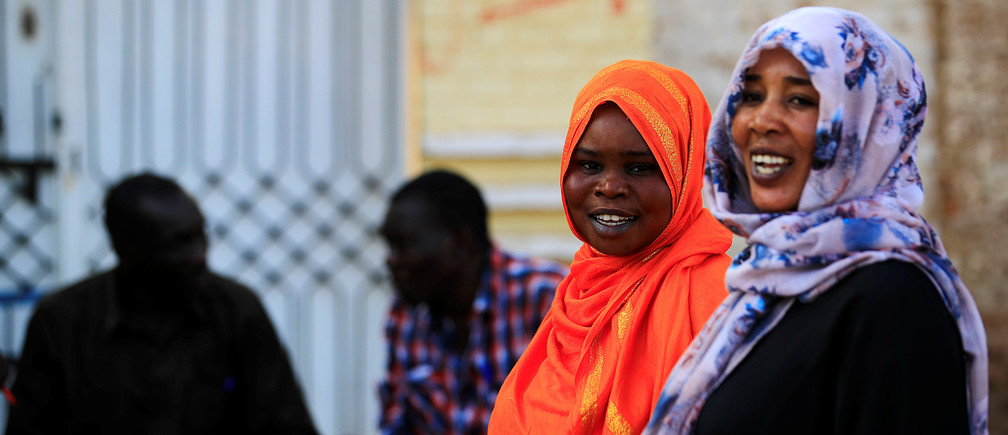A high-level delegation from the European Union headed by High Representative for Foreign Affairs and Security Policy and Vice-President of the European Commission (HRVP) Josep Borrell, visited El Fasher, capital of North Darfur, and nearby Zamzam camp for the displaced yesterday.
Community leader Adam Ishag told Radio Dabanga from Zamzam camp that the EU official asked questions about the food aid provided in 2019, the security situation in the camp, and the peace negotiations in Juba.
“During the meeting, we told him about the great shortages of food aid in 2019, the big rise in prices of consumer goods at the markets, and shortages of medicines and safe drinking water,” he said.

The displaced assured the European official that the security situation in the camp has been relatively stable after the overthrow of Al Bashir’s regime in April 2019. They said they support the handover of those wanted by the International Criminal Court, including ousted president Omar Al Bashir. They also said they wish individual and collective compensation for their losses.
The EU delegation met with the government of North Darfur and its security committee, with governor Maj Gen Malik El Tayeb, with representatives of the UN-AU peacekeeping mission in Darfur (Unamid), and with international relief organisations working in Darfur.
The one-day visit to El Fasher is part of the European Commission’s endeavours to support peace and democratisation in Sudan, to assist economic reforms, and to support economic opportunities for the many unemployed young people in the country.
During his visit to El Fasher, Borrell described the change that Sudan witnessed as unique because of its embodiment of the slogan “Freedom, Peace, and Justice”.
He pledged to cooperate with Sudan’s transitional government to support the country’s transition to stability and development.
He also stressed the support of the European Union Commission for Sudan’s transitional government to achieve peace and stability and to improve the humanitarian situation in Darfur.
During his meeting with Maj Gen Malik El Tayeb, governor of North Darfur, Borrell reiterated the European Commission’s interest in dealing with the situation in Darfur, especially with regard to the return of the displaced and refugees, and in providing humanitarian assistance.
‘A light of hope’
Borrell also addressed students of Khartoum University that same evening. In his speech, he called Sudan and Ethiopia “a light of hope in Africa today”. He stated that “the young people of Sudan, and especially the women, inspired the world and showed that change is possible”.
He said that Europe is “reconsidering its partnership with Africa”. “The European Union fully supports your call for peace, justice and liberty”, he claimed. “We want Sudan to succeed.”
He recalled that European countries have been fighting for centuries. “At one point we were so tired of killing each other that we decided to build a common and peaceful future.”
He compared the transition from dictatorship to democracy in his home country Spain to that in Sudan. He said that he understands the impatience for change and commemorated the “victims of the Glorious Revolution”.
€240 million a year
Borrell stated that the European Union supports Sudan with €240 million a year. “I know, it is not enough”, Borrell added. He announced that the European Union is going to spend an additional €100 million during the transitional period, that lasts until free elections will be held at the end of 2022. “Don’t think we do that because we are rich and generous. We do that for our own interest. If we don’t help you to develop, if we don’t help you to stabilise politically, if we don’t help to really cover the triangle of prosperity, democracy and sustainable development, we will be negatively affected. Helping Sudan is also building our own future.”
Borrell emphasised there is an urgent need to rebuild the higher education sector in Sudan. The EU is going to contribute to that. “Last year 30,000 African students got an Erasmus scholarship to study in Europe and we plan to increase that number to 90,000.”
When questioned by students Borrell denied that the European Union has ever given support to Sudanese militia (like the Rapid Support Forces) and government forces to stop people from African countries to migrate to Europe through Sudan.
He added that “Europe can not afford an invasion of people trying to reach Europe in an irregular way, risking their lives. We can not afford people to believe that they will be accepted if they arrive irregularly. Why do we have consulates delivering visas? That is the way to reach Europe regularly. Europe needs regular migrants. But migrants that reach Europe irregularly will be sent home. It is not worth risking your life for that.”

